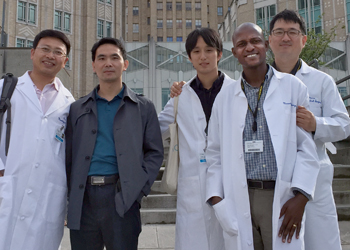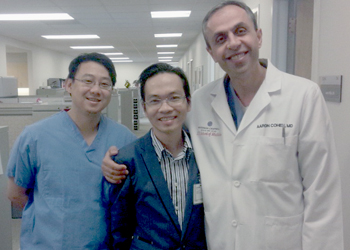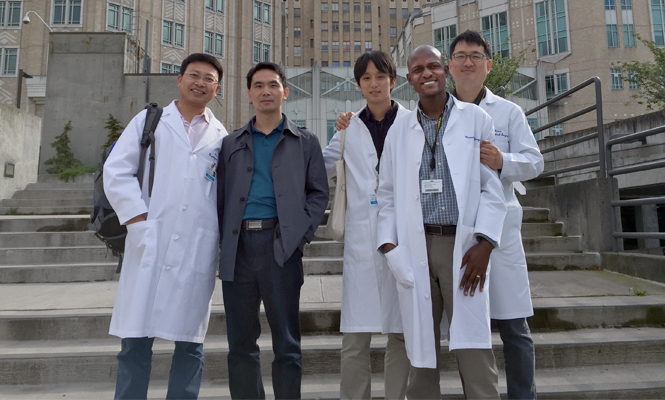There are about 9,500 air miles between Seattle and Dar es Salaam, Tanzania. If you are lucky to find a direct flight, you will be in the air more than 18 hours. About the same is true for traveling the 8,800 air miles between Ho Chi Minh City, Vietnam and Indianapolis. However, bridging those distances would be the easy part, as there are many differences dividing the countries when it comes to practicing neurosurgery.
Two doctors who are striving to bridge this gap and bring new developments to their countries are neurosurgeons Mugisha Clement Mazoko, MD; and Bui Xuan Bach, MD, from Dar es Salaam and Ho Chi Minh City, respectively, the recipients of the 2015 AANS International Visiting Surgeon Fellowships.

Dr. Mugisha is one of five neurosurgeons serving a population, as estimated by the World Bank, of more than 50 million in Tanzania, where he is developing skills to overcome the lack of modern technologies available, and instructing others to do so as well. Last year, David T. Pitkethly, MD, FAANS(L), from the University of Washington guided Dr. Mugisha as he performed surgery on a patient with an anterior communicating artery aneurysm in Tanzania. This procedure was a success, and the experience made it clear to Dr. Mugisha that skill transfer is a powerful tool for saving lives.
Through the American Association of Neurological Surgeons (AANS) International Visiting Surgeon Fellowship, Dr. Mugisha was able to participate in the Institute for Simulation and Interprofessional Studies (ISIS) Surgical Skills Lab at the University of Washington under the guidance of Laligam Sekhar, MD, FAANS, and gain further skills and knowledge to impart upon his return home. His goal from the beginning was to take this training back to Tanzania and work collectively with his colleagues to reduce the number of unnecessary referrals of patients abroad; minimize complications; lower post-operative morbidity and mortality rates; and improve patient outcomes. According to Dr. Mugisha, “The fellowship has sharpened my skills in skull base and cerebrovascular surgery. I believe my surgical outcomes will never be the same, only better, and my colleagues and patients will benefit the most.”

Dr. Bach has been developing his skills from afar as well and translating those to fit the technologies available to him in Vietnam. He has committed himself to the self-study of online resources, such as the AANS Operative Grand Rounds videos. As a neurosurgeon in Vietnam, Dr. Bach faces high levels of traumatic brain injury resulting from daily traffic accidents, and he and his colleagues are limited in the treatments they can provide.
The AANS International Visiting Surgeon Fellowship provided him with the opportunity to observe Aaron Cohen-Gadol, MD, MSc, FAANS, in person at Indiana University where he learned about advanced techniques and how to apply them to the treatment of patients in his home country. However, what impressed Dr. Bach most about the practice of neurosurgery in the United States was the way doctors communicated with their patients, as well as the working spirit of the medical staff in general. Upon returning to Vietnam, Dr. Bach hopes to influence the practice of neurosurgery at home in technique and through compassion, sharing these words of advice with his colleagues: “The wealth of a nation and the salary benefits do not affect our attitude towards the patient.”
The AANS International Visiting Surgeon Fellowship provides two neurosurgeons from developing countries opportunities to further their education at programs throughout the United States. The fellowship provides a stipend for up to three months, reimbursement for round-trip airfare and travel reimbursements for domestic travel to and registration for the AANS Annual Scientific Meeting. Applications are accepted from April through July for the following year; more information about the application submission process can be found here.
[aans_authors]








